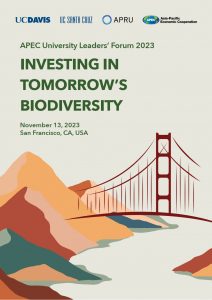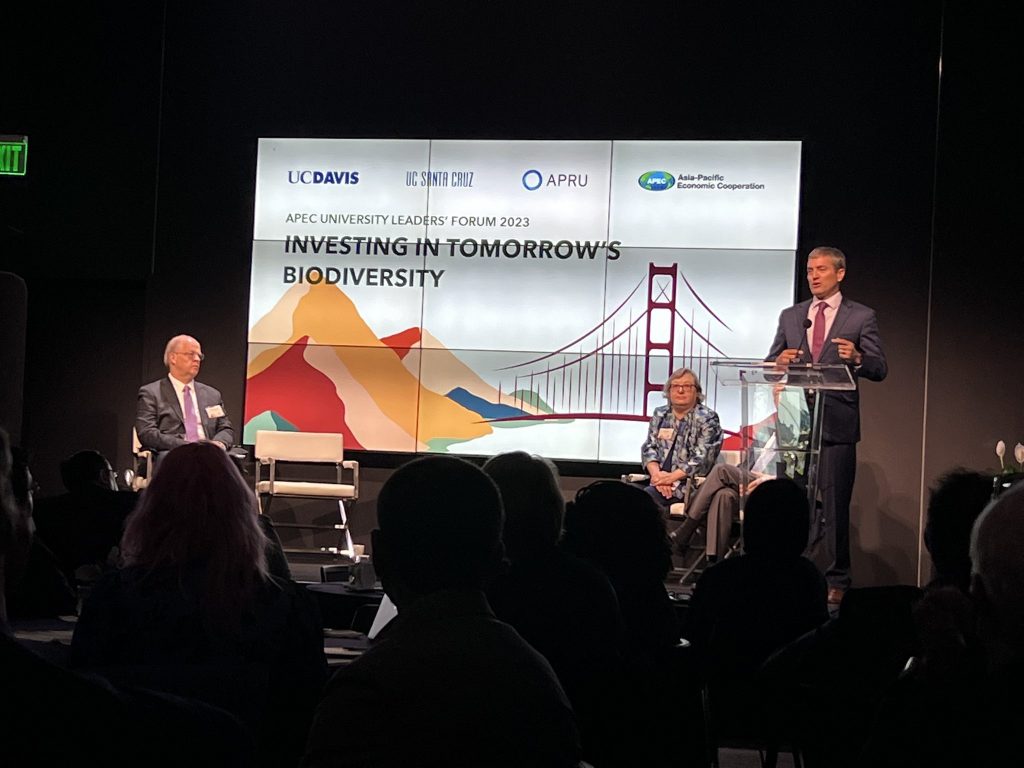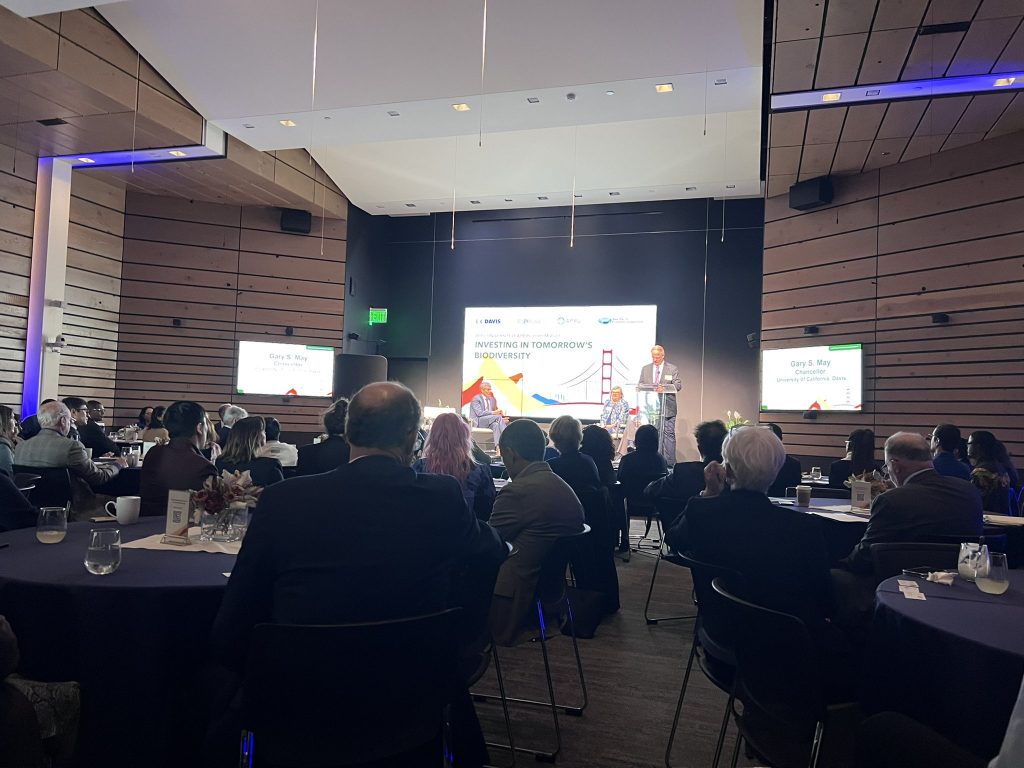
University of the Philippines President Angelo A. Jimenez delivered the concluding remarks during the Asia-Pacific Economic Cooperation (APEC) University Leaders’ Forum held in San Francisco, California, on November 13, 2023. President Jimenez was accompanied by UP Resilience Institute Executive Director Alfredo Mahar Lagmay.
The Forum is hosted by the University of California-Davis and the University of California-Santa Cruz with Association of Pacific Rim Universities (APRU). This high-level dialogue between CEOs, policy leaders, university presidents and top researchers aims to play an influential international role in Investing in Tomorrow’s Biodiversity. It took place as a collaborative event in the APEC CEO Summit and offers an opportunity for leadership in implementing a global plan for biodiversity. It also aims at producing new insights and identifying the partnerships needed for investing in conservation and restoration of biodiversity.
Read UP President Jimenez’s speech below:
Our troubles are mounting but peace be on all of us. As-salamu alaykum. A pleasant afternoon.
I extend my heartfelt appreciation and congratulations to each one of you as we conclude this APEC University Leaders’ Forum on “Investing in Tomorrow’s Biodiversity.” It has been an honor to share this platform with esteemed leaders, scholars, and visionaries committed to addressing the critical issues of today.
As substantive as our discussions on biodiversity have been, we cannot escape the fact that we are meeting in one of the most difficult and challenging periods for humanity since the end of the last World War. Many parts of our globe are shaking and coming apart under tragic conflict. Poverty and hunger continue to haunt billions of people. And on the immediate horizon, artificial intelligence is posing more serious questions than answers for human civilization.
Against this backdrop, we are all threatened by climate change—not only we humans, but all life as we know it on this planet. And like the most devastating of wars, this change is, as we all know, man-made. We have waged war, as it were, on ourselves, on Nature, and on the future. The question now is whether we can find the wisdom, the will, and the means to make peace with the Earth and ensure our own survival.
We have spoken all day about the severe threats faced by global biodiversity, coastal communities, and the world’s food production systems. We all know the urgent need for sustainable development, and for concrete measures to ensure climate adaptation, environmental resilience, water resource management, and food security, among others.
As we fly home to deal with our specific situations, I suggest we ponder three key questions.
First: Are existing international and national governing institutions adequately prepared to handle the global threats we face today?
We raise this question because we are alarmed by the failure of the annual Conference of Parties or COP to agree on deadlines on the phasing out of coal and fossil fuel and on climate finance to help developing economies like ours manage the difficult climate adjustment and transition programs. At the national level, many countries remain unable to deliver on their mitigation commitments under the Paris Agreement of 2015. Rhetoric is cheap, but the costs of climate change to our economies and societies are real. It is Code Red for the Philippines and other countries in Asia. Alternating floods and droughts have been growing in intensity each year, severely damaging our economy and eroding our food security.
Incidentally, the Philippines, which has contributed less than one percent to global GHG emissions, is among the top five countries considered most vulnerable to climate risks. About 60 percent of our people live in coastal towns and villages, for whom a sea rise of one to two meters will be calamitous. This is why we listened attentively to the discussions in this forum on how to mitigate climate impacts on coastal communities.
Second key question: What can our universities do to fight or mitigate climate change? We hold the keys to enormous troves of knowledge and produce new knowledge through research all the time. How much of that knowledge translates to practical solutions to real-world problems? Beyond amassing citations and achieving high global rankings, what do our universities strive for in our societies?
In our university, for example, one of our answers to this question has been the operational research undertaken by faculty members and researchers through our Resilience Institute, which has helped local communities build disaster resilience through trans-disciplinary actions, such as multisectoral and anticipatory development planning. These communities are involved from the very start of research, so they have a real stake in its outcome. We have also adopted an open-data policy, to share what we have learned with others.
In other words, we need to get our feet wet and our hands dirty before our libraries and laboratories are flooded.
Third key question: Can there be a greater moral imperative of our time than climate justice? Aside from measures to save and repair the planet, climate justice involves social justice, in that it must empower the most vulnerable victims of climate change to articulate their concerns, demand accountability, and seek proper redress for their grievances.
At the same time, green transition must be just and transformative. Within our industries, for example, we must ensure that workers and communities reliant even on fossil-dependent industries and sectors, especially in developing countries, are not unduly displaced. A just transition to green industries must mean a transition to a better life, to more jobs, and to a low-carbon and climate-resilient economy.
Also, it must protect and improve life for all elements of our ecosystems, because the impacts of climate change extend far beyond human affairs. Climate justice encompasses the intricate web of biodiversity that includes plants, animals, organisms—the very fabric of our planet. The forces threatening us are global in nature, underscoring the urgency of our collective responsibility. In our pursuit of progress, let us always remember that our common survival is at stake, and our actions today will reverberate through generations to come.
As we conclude this forum, let us remind ourselves that our role as educators extends beyond the confines of academia to our streets, our homes, our rivers, and the very grass beneath our feet. As we share this world, so we share in its well-being. And by contributing to the well-being of humanity and the planet, we contribute as well to the peace and prosperity our peoples everywhere so ardently desire.
In the spirit of collaboration and shared responsibility, allow me to call upon each university leader present here today to join hands in creating a sustainable and resilient future for all. Indeed, we must create a network among ourselves to provide training and education on climate change and sustainable practices, so we can share vital knowledge with those who suffer at the short end of climate justice.
Where governments fail or fall short, universities can and must act. Let us work together to amplify our impact, inspire change, promote transformative education, and usher in an era where investing in tomorrow’s biodiversity is not just a choice but an inescapable responsibility for all.
Thank you very much.


